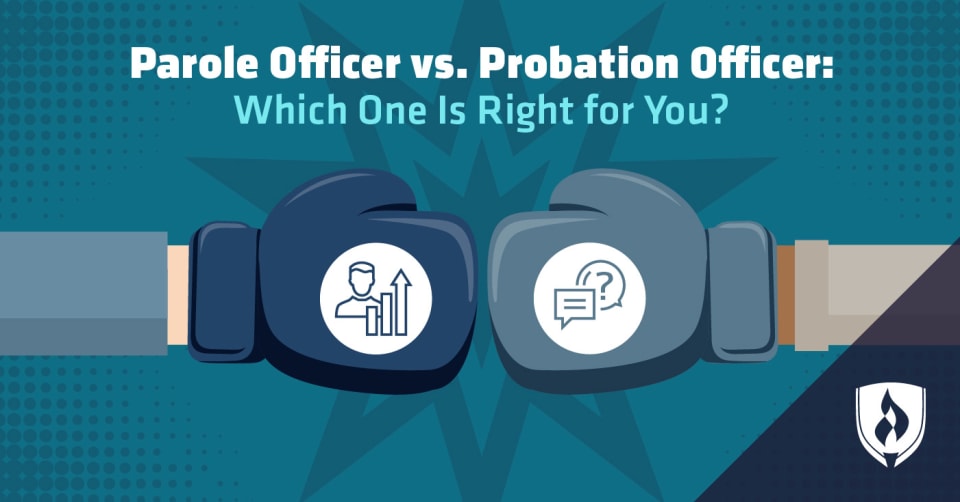
You’re that person who can talk to just about anyone, regardless of their background. You enjoy helping people get on a better track and love the idea of work that keeps your community safe. If you’re considering a career in criminal justice, you’ve probably encountered the parole officer versus probation officer conundrum.
You know both professions play a pivotal role in the criminal justice system, but you have no idea how they differ from one another. How can you confidently choose your career path if you don’t know where each path leads?
Consider this article your road map. We used a combination of government information, real-time job analysis software and expert insight to help you understand the differences when comparing a parole officer versus probation officer.
Parole vs. probation: The functional differences
With such similar names and functions, it’s understandable that there is some confusion over parole versus probation. Both terms involve law enforcement supervision over people who’ve broken the law. But parole and probation are also very different in how they are assigned.
What is parole for?
“Parole is when an offender has served time in prison and is given an opportunity to serve the remainder of his/her sentence under supervision in the community,” says Rose Du Houx Pogatshnik, Law Enforcement program chair at Rasmussen University.
Prisoners may be released to parole by a parole decision board (discretionary release) or according to provisions of a statute (mandatory release), according to the Bureau of Justice Statistics (BJS).1 Parolees are usually required to abide by certain guidelines and failure to comply can result in a return to incarceration.
Many agencies have updated their names and missions to community corrections because it better reflects the goal of the job, Pogatshnik says. “To provide supervision within the community.”
What is probation for?
“Probation is generally a sentence given in lieu of jail or prison,” Pogatshnik says. Probation is normally reserved for people who have committed nonviolent offenses. A judge will opt for a probation sentence if he or she believes the perpetrator can benefit and recover by working or going to school.
Individuals on probation can have widely different supervision requirements. Those sentenced to active supervision must regularly report to their assigned probation officer. Those on an inactive supervision status are exempt from regular reporting.
Parole officer vs. probation officer: The careers
The primary role of both these careers is to supervise offenders and ensure they meet the conditions set by the court or jurisdiction, according to Pogatshnik. “Parole and probation officers share the common purpose of supervising offenders. The key difference is when that supervision is taking place.”
In the case of parole, it’s after incarceration.
What does a parole officer do?
Most parole officers are employed by state or local governments with the stated purpose of helping individuals make the difficult transition back into the community after incarceration. Parole officers meet regularly with their parolees to ensure they are abiding by the conditions of their release. A parole officer may also play a role in deciding whether a parolee goes back to prison if violations occur.
Working with violent offenders makes the role of a parole officer quite dangerous. They make home inspections and perform other tasks that put them in close proximity with their parolees. The job can be risky, but it’s also rewarding to assist in the reform and rehabilitation of people who are trying to bounce back from incarceration.
Duties of a parole officer:
- Meet with soon-to-be-released inmates to create individualized parole plans
- Help parolee find a place to live, employment and/or treatment for mental health issues
- Monitor and evaluate progress
- Conduct drug/alcohol tests and home visits to ensure conditions of release are being met
- Attend court hearings and communicate with employers/counselors regarding parolees
What does a probation officer do?
Much like their parole counterparts, these government employees are responsible for policing the behavior of the probationers assigned to them while also helping them succeed in the community.
Probation officers usually work with nonviolent or first-time offenders in the hope of leading them away from further criminal behavior. While they still conduct home visits and interview family members, they are seldom armed and face somewhat lower risks on the job since their primary population involves nonviolent offenders.
Duties of a probation officer:
- Interview offenders and make recommendations to judges for conditions of the sentence
- Monitor offender to ensure they are abiding by the terms of their probation
- Regularly meet with probationers to assess progress, administer drug tests and follow up with treatment plans
- Write pre-sentencing reports and document visits with probationers
For more on this role, check out Pros Expose 6 Things You Should Know Before Becoming a Probation Officer.
Parole vs. probation: Job requirements
If one of these positions is starting to pique your interest, the next logical question is: What do I need to do to become one? Learn about the educational and training requirements needed for each career.
Parole officer requirements
First and foremost, prospective parole officers usually acquire a bachelor’s degree in criminal justice, psychology, social work or a related field. We analyzed hundreds of parole officer jobs posted over the past year to find out what employers are looking for. About 72 percent of listings called for at least a bachelor’s degree.2
Many parole officers will also attend a parole academy, similar to a police academy, prior to assuming their role. Candidates must also pass extensive background investigations to ensure they have no felony convictions in their past. Other requirements might include oral, written, physical and psychological exams, depending on the employer.
Probation officer requirements
The formal education needed for probation officers is similar to that of parole officers. Once again, a bachelor’s degree in criminal justice, corrections, human services or psychology is the most common requirement. The aforementioned job analysis found that 69 percent of employers require their probation officers to have at least a bachelor’s degree.2
Most probation officers also must complete a training program sponsored by their state or the federal government. They may work as an officer-in-training for up to one year before entering a full-time position and will also need to pass background checks.
Parole officer vs. probation officer: Choosing your role
As you can see, these jobs are deeply similar. Pogatshnik says students might choose a career direction based on the populations they are most interested in working with. “For example, depending on the jurisdiction, there might be opportunities with offense-specific offenders such as those with drug or alcohol offenses.”
You might gravitate toward intensive supervision caseloads where offenders are higher risk and need more supervision. Or you might prefer more generalized caseloads involving misdemeanor offenders. Pogatshnik says most entry-level jobs are either assistant roles or involve lower-stakes caseloads to give new recruits some time to learn the ropes.
Some states no longer use “parole vs. probation” as specific terminology and have shifted into more generalized terms for supervisory roles, Pogatshnik notes, adding that federal, state and county level opportunities are all available. Each of these “levels” will involve their own rules and quirks—making the employer side of these careers a big differentiator in what you might do on the job.
Explore careers in criminal justice
By now you have a much better idea of the differences between a parole officer versus a probation officer. While there’s plenty of overlap between these rewarding roles, there are also important distinctions to consider when mapping a potential career path.
If you’d like to learn more about careers in the criminal justice field, our article “9 Careers in Criminal Justice for Degree Holders to Consider” is an excellent starting point.
Related Articles:
- What Does a Probation Officer Do and How Do You Become One?
- Breaking Down the Different Types of Prisons in America
- 17 Legal Podcasts That Will Pique the Interest of Aspiring Paralegals
- Is Cyberbullying Illegal? When Comments Turn Criminal
1Bureau of Justice Statistics, Office of Justice Programs, What is the difference between probation and parole? [accessed March 2019] https://www.bjs.gov/index.cfm?ty=qa&iid=324
2Burning-Glass.com (analysis of parole and probation officer job postings, Feb. 01, 2018, and Jan. 31, 2019)
EDITOR’S NOTE: This article was originally published in 2015. It has since been updated to include information relevant to 2019.




